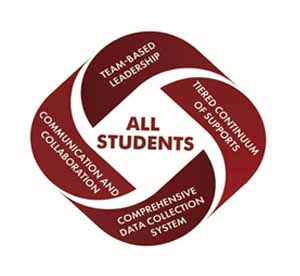MTSS conference to address adolescent literacy and classroom management

The Department of Education’s (DOE) Division of Special Education and Early Learning is hosting its summer conference June 25-26, 2024, in Oacoma. The event will highlight approaches to adolescent literacy and classroom management through Multi-Tiered Systems of Support (MTSS).
MTSS is a framework that is used to help educators provide academic and behavioral strategies to all students. The framework has two programs, RTI, or Response to Intervention, and PBIS, which refers to Positive Behavioral Interventions and Supports. RTI is designed to address academic progress while PBIS focuses on behavioral outcomes.
2024 MTSS conference – What’s in it for me?
“Each conference features two full-day keynotes, one focused on behavior and another focused on academics,” said Brandi Gerry, an implementation specialist with the DOE’s Special Education and Early Learning division. “This year’s academic keynote focus is adolescent literacy. DOE has done a great job providing foundational literacy training in a lot of areas for elementary students, and feedback from past conference attendees indicated that teachers are looking for literacy-related supports for students in upper elementary, middle, and high school. Participants who attend this year will learn how to best support students in those grades, how to identify gaps in students’ literacy skills, and evidence-based intervention strategies to close those skill gaps.”
The PBIS side of the conference will feature Dr. Terrance Scott, author of “Teaching Behavior: Managing Classrooms through Effective Instruction.”
“We want to make sure teachers have supports and tools for classroom management skills,” said Rebecca Cain, an administrator with the Office of Student Wellness and Support at the DOE. “We know we have a higher probability for success with students if we can prevent behaviors from occurring in the first place. Dr. Scott will provide strategies for proactive classroom management and preventing behaviors from escalating.”
Implementing MTSS locally
Schools interested in implementing either RTI or PBIS can join a DOE MTSS cohort and receive support from the DOE. Schools that are selected receive ongoing support from a dedicated MTSS Coordinator, professional development, grant funding, and free or reduced registration rates to MTSS-sponsored trainings. Currently, 28 school districts are participating in PBIS with the DOE, and 13 are supported through MTSS RTI.
The DOE’s MTSS framework includes four key components: team-based leadership, a tiered continuum of support, a comprehensive data collection system, and communication and collaboration. Of these four, leadership is the component that can make or break a school’s MTSS implementation success, said Gerry. “The most important person on that team is going to be your building principal. Schools who see the most positive outcomes have an involved building principal who is committed and invested in the process. The leader sets the tone and direction for the school.”
Thomas Stewart is the student support coordinator for Rapid City Area Schools. He is responsible for ensuring that teachers receive the training, support, and data they need to effectively implement MTSS in his district. “My role is to look for training for our interventionists because the more skills we have to work with these kids, the greater their propensity to help these kids when they struggle,” said Stewart. “I also have access to data, so I make sure staff is able to see the data, since data tends to be a key indicator of the need of the child.”
Stewart noted that the teachers and staff who are most effective at implementing MTSS tend to be those who have an ability to make connections with people. “If you can build a core foundation with these kids, then you have a better chance of understanding and reaching a child’s needs,” said Stewart.
The communication and collaboration component of MTSS refers to communication within the school team, but it also involves integrating a child’s family into finding solutions for their student. “Every time I’ve seen success with a child or family, there’s never any secrets because the team has been communicating with them from the beginning,” said Stewart. “That’s paramount – when that support at home is aligned with the support at school, that’s when kids succeed. Hands down, every time, that’s what works.”
Teachers can learn more about the DOE’s MTSS initiative by watching this webinar. Those interested in attending the summer conference should register by June 18.
